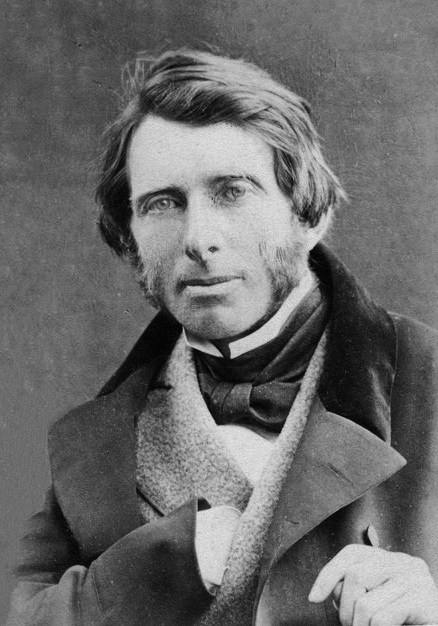Frases célebres de John Ruskin
Fuente: [Amate Pou], Jordi. Paseando por una parte de la Historia: Antología de citas. Editorial Penguin Random House Grupo Editorial España, 2017. ISBN 9788417321871, p. 117.
Fuente: [Marcelino Aranda], Mariana; [Ramírez Herrera], Dania. Administración de la Calidad: Nuevas Perspectivas. Grupo Editorial Patria, 2014. ISBN 9786074388169, p. 12.
John Ruskin Frases y Citas
“La sinceridad es la raíz de todas las virtudes.”
Fuente: [Muñoz], Asun. El baúl de los sueños. Editorial Palibrio, 2014. ISBN 9781463369644.
“La misma esperanza deja de ser felicidad cuando va acompañada de la impaciencia.”
Variante: La propia esperanza deja de ser una felicidad cuando va acompañada de la impaciencia.
Fuente: [Palomo Triguero], Eduardo. Cita-logía. Editorial Punto Rojo Libros, S.L. ISBN 978-84-16068-10-4, p. 120.
Fuente: [Barón Escamilla], Carlos. AC: Arquitectura de containers. Editorial Lulu.com, 2014. ISBN 9788461693177, p. 10.
“Más vale una muleta que la pérdida de un miembro.”
Ruskin condenaba la «restauración en estilo» de Viollet-le-Duc y sus seguidores en Inglaterra de los monumentos y edificios antiguos; consideraba la restauración tan imposible «como resucitar a los muertos», y sólo admitía intervenir para paliar preventivamente que el monumento se disgregue, o consolidar con vigas cuando se hunda, y de ahí la expresión de la cita.
Fuente: [García Morales], M.ª Victoria; Victoria [Soto Caba], Joaquín [Martínez Pino]. El Estudio del patrimonio cultural. Editorial Centro de Estudios Ramon Areces, S. A., 2017. ISBN 9788499612140, p. 185.
John Ruskin: Frases en inglés
Notes on the General Principles of Employment for the Destitute and Criminal Classes (1868).
Essay IV: "Ad Valorem," (p. 135 of 1881 edition http://books.google.com/books?id=59UWAAAAYAAJ&dq=%22leaving%20heaven%20to%20decide%20whether%20they%20are%20to%20rise%20in%20the%20world%22%20intitle%3AUnto%20intitle%3AThis%20intitle%3ALast%20inauthor%3AJohn%20inauthor%3ARuskin&pg=RA1-PA135#v=onepage&q=%22leaving%20heaven%20to%20decide%20whether%20they%20are%20to%20rise%20in%20the%20world%22%20intitle:Unto%20intitle:This%20intitle:Last%20inauthor:John%20inauthor:Ruskin&f=true|).
Unto This Last (1860)
St. Mark's rest; the history of Venice (1877).
Fors Clavigera, letter v (1 May 1871).
Fors Clavigera (1871-1878 and 1880-1884)
A Joy for Ever, lecture II, section 74 (1857).
Fuente: Dictionary of Burning Words of Brilliant Writers (1895), P. 264.
Volume III, part V, chapter II (1856).
Modern Painters (1843-1860)
Volume V, part IX, chapter III, section 52 (1860).
Modern Painters (1843-1860)
Lecture III
Lectures on Art (1870)
Volume I, part I, chapter II, section 9 (1843).
Modern Painters (1843-1860)
“Fine art is that in which the hand, the head, and the heart of man go together.”
The Two Paths, Lecture II: The Unity of Art, section 54 (1859).
At the annual meeting of the Royal Society for the Prevention of Cruelty to Animals (1877), in Arrows of the Chase, vol. 2 (in The Complete Works of John Ruskin, vol. 23 https://books.google.it/books?hl=it&id=Gpc3AAAAYAAJ), p. 129.
“There is really no such thing as bad weather, only different kinds of good weather.”
Quoted by John Lubbock, 1st Baron Avebury, The Use of Life, chapter IV: "Recreation" (1894).
Volume III, part IV, chapter XII (1856).
Modern Painters (1843-1860)
Lecture II, section 32.
The Eagle's Nest (1872)
Volume II, chapter VI, section 16.
The Stones of Venice (1853)
On Richard Wagner's Die Meistersinger
Letter to Georgiana Burne-Jones (June 30, 1882).
Quote, c. 1850's; describing Turner's perspective lectures; as quoted in The life of J.M.W. Turner, Volume II, George Walter Thornbury; Hurst and Blackett Publishers, London, 1862, p. 108
“In general, pride is at the bottom of all great mistakes.”
Volume IV, part V, chapter III, section 22 (1856).
Modern Painters (1843-1860)
Fuente: Dictionary of Burning Words of Brilliant Writers (1895), P. 123.
Volume III, part IV, chapter XII (1856).
Modern Painters (1843-1860)
On the Condition of Modern Art, lecture (1867).
Fuente: The Seven Lamps of Architecture (1849), Chapter III: The Lamp of Power, section 13.
“A little group of wise hearts is better than a wilderness full of fools.”
The Crown of Wild Olive, lecture III: War, section 114 (1866).
Fors Clavigera,, letter xlii, ( 1 June 1874 https://archive.org/stream/forsclavigera02ruskiala#page/204/mode/2up; quoted by William Archer in America To-Day).
Fors Clavigera (1871-1878 and 1880-1884)
“Engraving is, in brief terms, the Art of Scratch.”
Ariadne Florentina: Six Lectures on Wood and Metal Engraving, with Appendix, lecture I: Definition of the Art of Engraving, section 34 (1872).
Fuente: Dictionary of Burning Words of Brilliant Writers (1895), P. 563.
Essay III: "Qui Judicatis Terram," section 54.
Unto This Last (1860)
